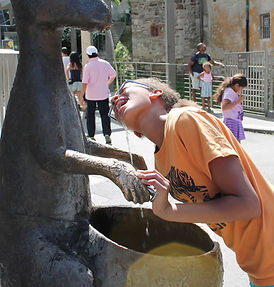
Responsible Travel
Traveling is a privilege and responsibility we do not take lightly. When done without intention, travel can be harmful to the planet, local ecologies, economies, and people. On the other hand, tourism can have important positive impacts on the communities and environments we visit. It’s not about if you travel, but HOW you travel. It’s an invitation to travel consciously and respectfully. Our advice and recommendations will help you make sustainable and respectful travel choices. Below are some key tips and small changes you can adapt. For families, this can be a great opportunity to instill these values early in young travelers.
Travel Practices That Minimize Environmental Harm
Consider your destination. Mass tourism can be destructive to popular sites. There’s a whole world out there, and some of the best travel destinations are the lesser-known ones. Also consider destinations whose tourism policy includes sustainability and carbon neutrality.
Limit carbon emissions caused by airline mileage by choosing the most direct flights, selecting locations within shorter travel distance, and considering alternatives to flying, when possible.
Pack as light as possible. The heavier the plane, the more feel needed, and the more carbon emitted.
Purchase carbon offsets along with your airline tickets.
Use public transportation. When possible walk, bike, or take a train or bus.
Eat locally-grown foods. Learn what is grown locally and adjust your diet accordingly while traveling.
Always travel with and use: reusable water bottle, towel, reusable straws and utensils, reusable tote/shopping bag. Don’t be afraid to politely tell a shop that you don’t need a single use plastic bag, straw, cup, or fork.
Limit your trash. Aim to do this double than you would at home. Many international travel locations do not have sustainable trash management or recycling. Bring some items home with you to be recycled rather than dispose of them in a place with no recycling.
Limit your water, air conditioning, and electricity use. Take shorter showers and turn off the lights and the AC in your accommodation when not using.
Use reef-safe sunscreen when in natural waters.


Travel Practices that Support Local Communities and Cultures


Whose land is it? Who is telling the story? Where are the resources going?
Stay at locally-owned accommodations. Look for accommodations in villagestays and locally-owned guesthouses.Avoid chain hotels and house rentals that are not individually owned.
Shop locally-owned. Prioritize the local economy for all purchases including souvenirs and food.
Choose local companies when for activities and excursions. However, even locally-owned companies can encourage excursions that are environmentally harmful, so do the research or let us advise you.
Avoid cultural displays put on solely for tourists. This sometimes takes research to know what is an authentic cultural event and what is shown in exploitative ways for tourists. We will find you authentic ways to experience local arts and culture.
Carefully consider animal encounter tourism. Many animal encounters are harmful and exploitive. We can help find those that are not.
Follow local tipping customs. These are an important part of local economies, and each country’s customs are different.
Learn about local environmental and economic challenges from residents in the place you are visiting.
Learn local customs. This is another way to show respect to the location and the peoples you are visiting.
Don’t be disrespectful when going for the photo op. Religious sites and ruins are not there for you to exploit for your Instagram photo. See below about respect.
Ask for permission. Is it OK to participate? Can I take a photo? Get permission and learn from locals where and how tourists can and cannot be involved.
Always be respectful. Remember you are the visitor, the site does not belong to you and is not there to meet your needs. Approach each location/site with humility and respect. If you are traveling with kids, teach them this.
Show gratitude. Learn "Thank You" in the language of where you are and use it over and over and over, genuinely. Be grateful for being welcomed into someone else's home.
